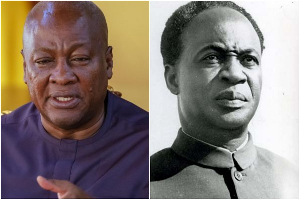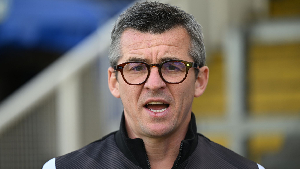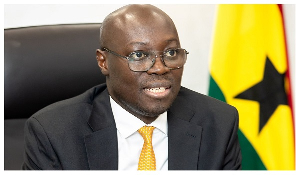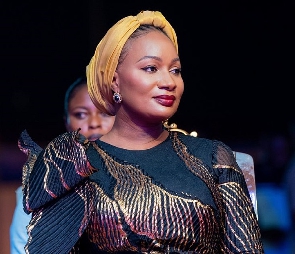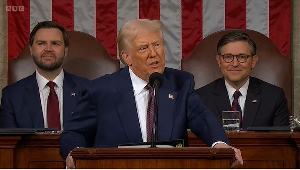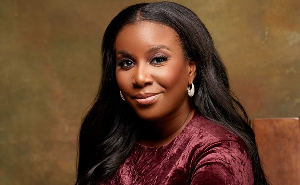Savannah View: A postcard from South Africa
By Manasseh Azure Awuni
Today the sun has refused to come out. It is 2 p.m. but it is still indoors. Yesterday was quiet different. Perhaps, it is only in these parts of the world that one can make real sense of the simile: “as unpredictable as the weather.”
Yesterday was very sunny but today is as if we’re in a different season, a freezing. The limb-numbing cold is biting deep into the skin. And for someone born and bred in the blistering savannah region of Ghana, I find it unbearable.
In fact, this kind of cold is not something one can ever get used to. Even those who were born and bred here are still yet to get accustomed to it. Cocooned in heavy jackets and hats, they move about shivering like feverish fowls as vapour escapes their mouths as they speak.
But Sakhile Mkhwanaze is sweating profusely. Donning a white long-sleeved shirt over pair of faded blue jeans, the man who looks like someone in his mid-thirties seems unaffected by his environment. And he is not alone. Close to 100 people, mostly women, are gathered around him. When I passed here the first time, I did not stop.
Back at Kwame Nkrumah Circle or Tema Station in Accra, such gatherings serve as opportunities for pick pockets to ransack their unsuspecting audience, mostly first time visitors to the city who are new to the wiles of the petty criminals who must survive. The information that the crime rate in South Africa is very high made me even more apprehensive as I decided to venture from Sandton City, where I’m lodging, to Randburg for the first time since I arrived in Johannesburg.
Today I want to have a feel of the real Johannesburg for the ordinary person so I boarded public transport for the first time. MTN Ghana and MTN Group Head Office in South Africa have collaborated to give yours truly a VIP treatment. I’ve been cruising around in a sleek and sexy Benz and my stay in the luxurious Davinci Hotel in Nelson Mandela Square at Sandton City almost concealed me from the reality on the ground. And I would have missed much if I limited myself only to the well-catered for sponsorship package for the Most Promising Journalist of the Year award I won last year.
And one interesting sight that has greeted me is this scene here at the Randburg Taxi Rank. Sakhile Mkhwanaze, I have realised is a musician. His album, Uyahalalela, is booming from a public address system while he passionately sings along. His spectators are not passive either. They are also absorbed in the music and some of the men display some awkward traditional dancing steps. A few young men and girls sell copies of the album, while a little transparent rubber bowl sits in the middle of the gathering for those who are touched to drop some coins. Its size greatly contrasts the huge collection boxes used by preachers in Accra and Kumasi to take offerings to “help the work of God.”
I consider this live musical performance spectacular because music is one of the three symbols I have grown to associate with the Rainbow Nation. The other two are apartheid and Nelson Mandela. These three symbols are much related and define the history of the nation.
Apartheid, which I considered one of the world’s worst atrocities against humanity, was fought by people who risked their lives to deliver their people and Mandela is one of such giant figures, having spent nearly three decades in prison for that cause.
South Africa is also home to some of Africa’s greatest musicians. Like Sakhile’s music which has held his audience spell-bound on this chilling Saturday afternoon, South African music has a way of holding its listeners captive even if one does not understand the lyrics, which are usually in in their local languages. Rebecca Malope, for instance, is my all-time favourite but I don’t understand almost all her songs.
Music is one of the forces that broke the back of apartheid. Like the Negro Spirituals sang by the slaves in Americas and West Indies, music served as a source of inspiration in the battle for freedom from the horrors of apartheid. As witnessed in the Sarafina movie, music was the medium to carry message of the struggle when the blacks of South Africa were dispossessed of their voices. One of the world’s greatest reggae artistes of all time, Lucky Dube, contributed to this cause.
It has been almost two decades since the fall of apartheid. But I have found out that all the three symbols that come to my mind when South Africa is mentioned are still very much alive.
Nelson Mandela is now old and frail, and media organisations are waiting anxiously to report the death of the world’s most respected statesman alive. And as I’ve witnessed here at Randburg Taxi Rank, South African music is still very strong and characterise almost every social gathering. Even President Jacob Zuma often ends his speeches with songs.
Contrary to what we have been made to understand, apartheid is still here in practice. It is still the servant-master relationship everywhere. "If you talk about poverty, it means you're talking about the blacks, and when you mention riches, it means you're talking about the whites," Brian Hlela, my driver told.
Nine out of every ten people I see driving cars in South Africa are whites. And ten out of every ten people who patronise public transport are blacks. The blacks still work mostly as domestic helps, labourers and those in charge of manual and any demeaning job you can think of.
“Nothing has changed,” says Brian. “The whites still own the shops and the businesses and it is difficult for the blacks to break through even with the BEE [Black Economic Empowerment] laws.”
“In cities such as Johannesburg, you don’t see the inhumane treatment of blacks. But in the rural areas and farms, most whites still treat the blacks the same way they treated us in the apartheid era,” says a middle-aged woman working in a multi-national company who wants to remain anonymous.
Brian says he was very hopeful when the country gained independence but the black politicians are a bunch of disappointment. Instead of thinking about the masses that still own nothing apart from their labour and their miserable lives, the politicians "are only thinking about how much they can get for themselves," says the 35-year old father of three.
In South Africa one does not necessarily need to speak to indigenes to feel the widening gap between the rich and the poor, the whites and blacks. In the era of apartheid, the blacks needed special waivers to be able to enter cities such as Johannesburg. That is no longer there, but they still do not have what it takes to enter any of the buildings that adorn the beautiful cities. They still don’t own them.
Julius Malema, the suspended youth president of the African National Congress was quoted by the media here as saying “South Africa is a banana republic.”
He is one person who is up for a radical move to nationalise certain establishments of the state in order to bridge the gaping difference between the blacks and whites. But that seems not to be the most feasible option. Reacting to a recent report that the Western Cape is the worst province in respect of employing black people, authorities of the province say the blacks do not have the capacity to occupy some of the positions.
The Chairman of the Chamber of Commerce of the area has blamed the educational system of that has made it impossible to get adequate number of black people. This means pragmatism, not radicalism, is needed to solve the problem.
The woes of the blacks in South Africa seem far from being over. From afar, one is likely to unreservedly condemn the xenophobic and criminal tendencies of some blacks in the area as reported in the media. But seeing opulence and extreme poverty and deprivation living next to each other may provide the basis for better appreciation of the South African situation.
Miners are currently striking against poor wages and poor condition of service. At least, 45 people have been killed since the demonstrations started last month. But they are relentless.
Perhaps, their resilience will yield the needed results as it did in the era of apartheid. But the daily reports of corruption and all manner of abuses by the black political elite appear to be the main bane of the black empowerment. It used to be the quest for the blacks to take control of the state of affairs and redistribute wealth. But for many South Africans, the issue of blacks ruling is now inconsequential.
“As for me I don’t care whether the person I’m voting for is black or white. What is important to me is how to make things better,” says Brian, a driver for a white-owned car rentals company, who has the dream of establishing his own business in future.
Savannah View is a weekly column published in the Tuesday edition of The Finder newspaper/Ghana. Writer’s email: azureachebe2@yahoo.com
Opinions of Tuesday, 18 September 2012
Columnist: Awuni, Manasseh Azure






